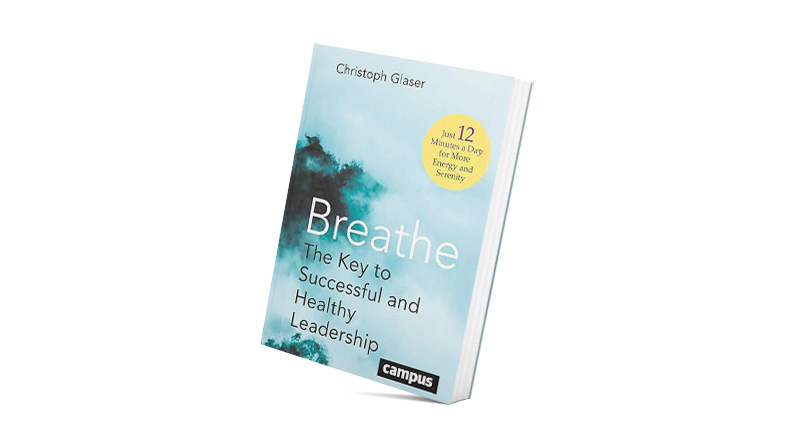Create a place for your customers to play
Gaming has become one of the world’s most powerful consumer ecosystems. Stefan Michel explores why every company now needs a strategy for play to stay competitive. ...
May 1, 2025 • by Albrecht Enders, Christoph Glaser in I by IMD Book Club
Mindfulness expert Christoph Glaser shares insights from Breathe, his best-selling book on how simple, breath-based techniques can reduce stress, sharpen focus, and help leaders stay centred under pressure....
The breath is both a physiological constant and a psychological lever. When used correctly, it can shift how we lead, decide, and relate.Christoph Glaser
At first glance, the idea of solving leadership stress with little more than breath might sound soft – even simplistic. But Christoph Glaser, CEO of the TLEX Institute and a long-time advocate of breath-based mindfulness, has made a career of showing the world’s most overextended executives that simplicity is precisely the point.
TLEX brings breath-based mindfulness training to leaders and teams in the corporate world, helping them reduce stress, improve focus, and build more human-centered workplaces.
Speaking at a recent IMD Book Club discussion hosted by Albrecht Enders, Glaser laid out the foundations of his best-selling book Breathe, The Key to Successful and Healthy Leadership, which argues for a radically accessible path to resilience: 12 minutes a day of conscious breathing.
Backed by emerging neuroscience and forged through his real-world experience of coaching leaders in some 50 countries, Glaser’s approach invites a rethinking of what performance means in the modern workplace and how to achieve it without sacrificing mental health.

Glaser’s journey into breathwork was neither academic nor accidental. As a restless Swiss teenager, he dreamt of becoming a soccer player until a severe back injury at 17 ended that ambition and left him facing the possibility of never walking again. After the limitations of conventional treatments, it was breathwork, he says, that ultimately unlocked both healing and freedom from pain.
This epiphany took him to India in 1997, for what was meant to be a two-week stay. He remained for half a year in India, in the Art of Living Centre in Bangalore and the Himalayas. “When I returned, I was completely pain-free. My family couldn’t believe it,” he said. “That’s when I knew I had to share this.”
Even just five minutes of breathwork can begin to reduce stress. It’s like a Swiss Army knife – it affects everything.Christoph Glaser
Fast-forward to today, and Glaser heads the TLEX Institute, an organization he helped build to introduce breath-based mindfulness to the corporate world long before it was a trend. His early client list is a roll call of improbable conversions, from the Saudi royal family to senior leadership teams at global banks.
His premise is elegantly uncontroversial, yet quietly radical: the breath is both a physiological constant and a psychological lever. And when used correctly, it can shift how we lead, decide, and relate. “Even just five minutes of breathwork can begin to reduce stress,” he noted. “It’s like a Swiss Army knife — it affects everything.”
With the average attention span today hovering at just 47 seconds, Glaser argues the importance of mindfulness has only grown more acute. “We try to out-robot the robots,” he said. “But we will always be second-best at that.” Instead, his work suggests that leadership needs to reclaim uniquely human traits: empathy, presence, and clarity under pressure.
Scientific studies lend weight to his message. Research cited in Breathe indicates that specific breath techniques stimulate the vagus nerve – a central regulator of the nervous system – lowering stress and boosting focus. Brain scans have shown that after mindful breathing sessions, the hippocampus (associated with learning and memory) is more active, while the amygdala (associated with fear and reactivity) is less so.
These findings are supported by peer-reviewed studies in neuroscience and psychiatry. “The breath brings us back to the present moment,” Glaser explained. “In presence, we have access to our intelligence. Not just cognitive, but emotional and intuitive intelligence.”
In practice, the effects are often subtle but far-reaching. Leaders become more emotionally intelligent, more resilient, and more attuned. That, Glaser stresses, matters far beyond the individual.
“When people are not authentic, we pick it up immediately,” he said. “Our blood pressure rises. We get tense. Trust erodes.”
More than personal insight, his remarks are supported by a growing body of research that suggests that humans are adept at spotting incongruence — between words and tone, expression, and intent – often within milliseconds. The brain’s threat-detection system, centered in the amygdala, responds almost reflexively when something in a social exchange feels off. The result is a measurable physiological shift, as Glaser described which, over time, can undermine trust in the workplace.
Glaser’s message may resonate with leaders in an era where burnout is endemic and digital overwhelm the norm. What makes his approach novel is not its ambition, but its practicality.
Glaser is under no illusions about the difficulty of sustaining habits such as the daily discipline of mindful breathing, as well as pausing between tasks, and cultivating presence in a world that seemingly rewards constant motion.
“We live in a society with an abundance of knowledge, but are we actually doing the things we know are good for us?” he asked. What makes breathwork compelling, he says, is its simplicity. “It doesn’t require equipment, it doesn’t need a guru. You already have everything you need.”
Among the techniques he recommends is what he calls the “breath of freedom” or more commonly termed the “physiological sigh” – two short inhalations, followed by a long, deep exhalation. This method has been endorsed by some neuroscientists, for its effectiveness in reducing stress and promoting calm.
But while the tools are accessible, the transformation is not instant. “It’s often said you don’t learn martial arts on the battlefield,” Glaser said. “You have to practice calm before the storm, not during.”
One of the most arresting takeaways from Glaser’s talk was his emphasis on practicing even when no one is watching. For Glaser, breathwork isn’t a performance tool but a personal practice — something that matters as much off-screen as it does in the spotlight.
This, perhaps, is where Breathe most directly challenges the conventional leadership doctrine. It doesn’t offer a blueprint for charismatic performance or a framework for quarterly results. It offers, instead, a reminder that leadership begins with self-awareness — and that calm is not the enemy of ambition, but its foundation.
Glaser’s message may resonate with leaders in an era where burnout is endemic and digital overwhelms the norm. What makes his approach novel is not its ambition, but its practicality. Just 12 minutes a day, he claims, can change the arc of a career — or even a life.
There’s no app for that. Just a breath. Then another.

Professor of Innovation and Strategy at IMD
Albrecht Enders is Professor of Strategy and Innovation at IMD and co-director of the Transition of Business Leadership program, and the Complex Problem Solving. His major research, teaching, and consulting interests are in the areas of managing discontinuous change and top-team strategy development processes. Before joining IMD, Professor Enders spent three years as a consultant with The Boston Consulting Group in Cologne where he worked on projects in the areas of financial services, energy, and industrial goods.

CEO of the TLEX Institute
Christoph Glaser is the CEO of the TLEX Institute, a global training institute that provides leadership and self-management programs based on breath-based mindfulness. With over 20 years of experience, he has delivered training and consulting services to diverse clients in 60 countries, including heads of state, top executives, students, and community leaders. Glaser is also the Managing Director of the World Forum for Ethics in Business, where he organizes and moderates annual leadership conferences held in the European Parliament. He is the author of Breathe – The Key to Successful and Healthy Leadership.
December 1, 2025 • by Stefan Michel in I by IMD Book Club • 4 min read
Gaming has become one of the world’s most powerful consumer ecosystems. Stefan Michel explores why every company now needs a strategy for play to stay competitive. ...
October 31, 2025 • by Paul Vanderbroeck, Susan Goldsworthy in I by IMD Book Club • 5 min read
IMD's Susan Goldsworthy was joined by Paul Vanderbroeck, whose unique book, Lead Like Julius Caesar: Timeless Leadership Lessons from History's Most Influential Leader, dissects the leadership style and career of the Roman...
September 1, 2025 • by Andrew Sharman , Amy Walters Cohen in I by IMD Book Club • 5 min read
IMD’s Andrew Sharman sits down with Amy Walters Cohen, whose award-winning book Ruthlessly Caring challenges conventional leadership – and offers a paradoxical path forward in a world in flux....
July 30, 2025 • by Julia Binder, Cass R. Sunstein in I by IMD Book Club • 5 min read
In his book Climate Justice: What Rich Nations Owe the World – and the Future, Cass R Sunstein delivers a timely exploration of the moral and practical obligations that wealthy nations have...
June 20, 2025 • by Knut Haanaes, Martin Reeves in I by IMD Book Club • 5 min read
BCG’s Martin Reeves traces the messy human journey behind one of tech’s most contagious features – and what it reveals about innovation, behavior, and unintended consequences. ...
May 30, 2025 • by Brian Evergreen, Stefan Michel in I by IMD Book Club • 5 min read
Brian Evergreen shares radical insights from his book Autonomous Transformation: Creating a More Human Future in the Era of AI with IMD’s Stefan Michel....
May 1, 2025 • by Albrecht Enders, Christoph Glaser in I by IMD Book Club • 8 min read
Mindfulness expert Christoph Glaser shares insights from Breathe, his best-selling book on how simple, breath-based techniques can reduce stress, sharpen focus, and help leaders stay centred under pressure....
March 28, 2025 • by Jim Pulcrano, Matthew C Weinzierl, Brendan Rosseau in I by IMD Book Club • 7 min read
Authors of Space to Grow, Matthew Weinzierl and Brendan Rosseau, tell IMD's Jim Pulcrano that one of the central aims of their book is to inspire industries, businesses and individuals...
February 26, 2025 • by Heather Cairns-Lee, Eugene Sadler-Smith in I by IMD Book Club • 8 min read
Heather Cairns-Lee from IMD and leadership expert Eugene Sadler-Smith discuss why intuitive intelligence is a critical skill in a data-driven world....
January 17, 2025 • by Julia Binder, Knut Haanaes in I by IMD Book Club • 7 min read
IMD's Julia Binder and Knut Haanaes explore how aligning purpose with profit, fostering innovation, and building resilience, can help companies embed sustainability into business strategy....
Explore first person business intelligence from top minds curated for a global executive audience